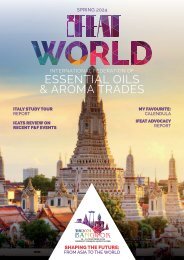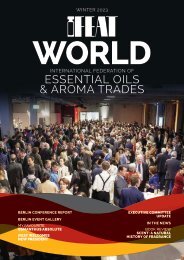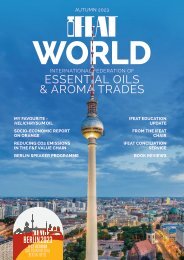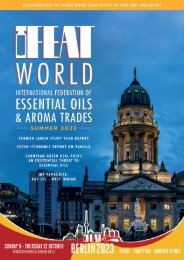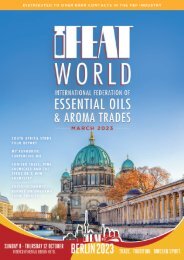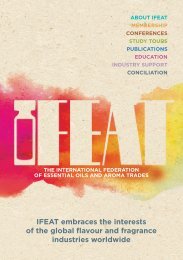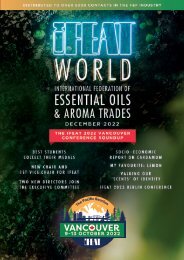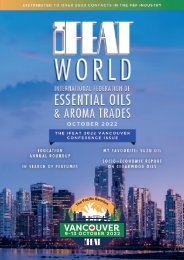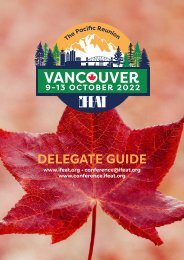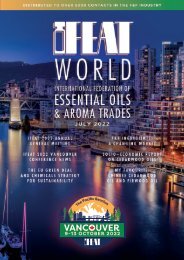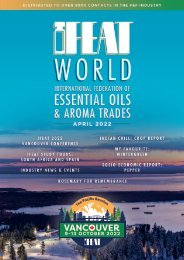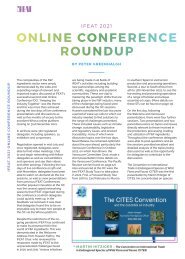You also want an ePaper? Increase the reach of your titles
YUMPU automatically turns print PDFs into web optimized ePapers that Google loves.
12<br />
WORLD<br />
JALAL CHARAF, HUSSEIN A. FAKHRY AND DOMINIQUE ROQUES<br />
• There is a need to disseminate<br />
information, particularly to new<br />
producers, about pesticides issues<br />
since they are often unaware of the<br />
concentration issues.<br />
• The view was expressed that in three<br />
to five years’ time in Europe the use<br />
of pesticides/herbicides will be<br />
banned – but there still remains the<br />
issue of pesticide residues in the soil<br />
lasting for many years.<br />
• Also, it was argued that while<br />
some growers recognised the need<br />
to minimise pesticide/herbicide use,<br />
they are vital to ensuring the supply<br />
of some oils.<br />
FUTURE ESSENTIAL<br />
OIL SUPPLIES AND<br />
INVESTMENT<br />
A majority of those present felt that<br />
growth in demand and continued supply<br />
shortages was a lasting trend rather than<br />
one of the typical cycles in the industry.<br />
Nevertheless, individual product cycles<br />
would continue, and some oil prices<br />
would come down because of shortterm<br />
over-expansion of production, e.g.<br />
helichrysum. However, it was argued that<br />
many producers are reluctant to invest<br />
unless they can obtain commitments from<br />
companies to purchase using medium or<br />
longer-term contracts. But major traders<br />
and retailers will not lock into long-term<br />
prices – and at present will not permit<br />
price increases even if raw material<br />
prices rise.<br />
While hard and fixed contracts are<br />
unlikely to work in farming, some<br />
larger companies, especially those in<br />
the aromatherapy sector, appear to be<br />
developing new business models with<br />
flexible and longer-term contracts with<br />
essential oil suppliers. A number of<br />
instruments and support mechanisms are<br />
being utilised to encourage and facilitate<br />
production, such as pre-payments, cooperatives,<br />
provision of correct planting<br />
materials and agronomic advice.<br />
Moreover, producers are currently in a<br />
better position to obtain greater longerterm<br />
commitments from their buyers.<br />
It was reported that private equity<br />
operations have analysed the market<br />
and are willing to invest in production.<br />
But it is not easy convincing farmers to<br />
go into the essential oils business. Land<br />
might be available, but farmers need<br />
education and other types of support.<br />
In addition, there is a need to invest in<br />
new ways of production and extraction,<br />
with reduced energy inputs.<br />
The current situation should be viewed<br />
as an opportunity rather than a<br />
challenge. Honesty and transparency<br />
should be the key words in any<br />
business relationship. In the past, the<br />
F&F industry has been known for its<br />
secretiveness but there should be a<br />
greater willingness to share information<br />
and knowledge if we are to overcome<br />
the current difficulties. The IFEAT<br />
app developed for the Cartagena<br />
Conference was praised as a means<br />
of sharing information and promoting<br />
companies and products – and would<br />
facilitate the entry of new companies<br />
into the business. It was also suggested<br />
that IFEAT should gather information<br />
about every essential oil to facilitate<br />
investment, but it was recognised that<br />
this would take a lot of resources and<br />
effort if full transparency was to be<br />
achieved. Moreover, can a database<br />
be possible given the recent EU GDPR<br />
(General Data Protection Regulation)?




